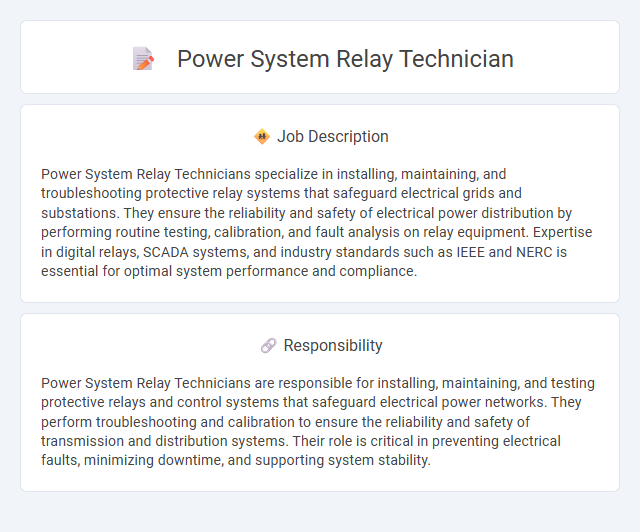
Power System Relay Technicians specialize in installing, maintaining, and troubleshooting protective relay systems that safeguard electrical grids and substations. They ensure the reliability and safety of electrical power distribution by performing routine testing, calibration, and fault analysis on relay equipment. Expertise in digital relays, SCADA systems, and industry standards such as IEEE and NERC is essential for optimal system performance and compliance.
Individuals with strong analytical skills and attention to detail are likely to excel as Power System Relay Technicians, as the role demands precise monitoring and testing of electrical protection systems. Those comfortable working in high-pressure environments and possessing a solid understanding of electrical engineering principles may find this career particularly suitable. However, people who struggle with complex technical concepts or prefer less hands-on, routine tasks might encounter challenges in adapting to the job requirements.
Qualification
A Power System Relay Technician must possess a strong foundation in electrical engineering principles, typically demonstrated through a relevant technical diploma or degree. Hands-on experience with protective relays, circuit breakers, and system testing equipment is essential for ensuring accurate installation, calibration, and maintenance. Proficiency in interpreting electrical schematics, knowledge of industry standards such as IEEE and ANSI, and strong troubleshooting skills are critical qualifications for success in this role.
Responsibility
Power System Relay Technicians are responsible for installing, maintaining, and testing protective relays and control systems that safeguard electrical power networks. They perform troubleshooting and calibration to ensure the reliability and safety of transmission and distribution systems. Their role is critical in preventing electrical faults, minimizing downtime, and supporting system stability.
Benefit
Power System Relay Technicians likely enjoy job stability due to the essential nature of maintaining electrical grid safety and reliability. The role probably offers competitive salaries and opportunities for overtime, reflecting the technical expertise required. Benefits may include career advancement prospects and specialized training, enhancing long-term professional growth.
Challenge
Power System Relay Technicians likely face complex challenges involving the diagnosis and maintenance of protective relay systems to ensure reliable power delivery. Troubleshooting intricate electrical faults and interpreting sophisticated relay configurations may require advanced technical knowledge and problem-solving skills. Continuous adaptation to emerging technologies and stringent safety standards could further increase the job's demanding nature.
Career Advancement
Power System Relay Technicians specialize in installing, testing, and maintaining protection systems for electrical grids, which are critical for preventing power outages and equipment damage. Advancing in this career often involves gaining certifications such as NERC CIP and obtaining experience with digital relays and SCADA systems, leading to roles like Senior Relay Technician or Protection Engineer. Mastery of advanced diagnostic tools and expertise in automation protocols significantly enhances opportunities for leadership positions within utility companies and consulting firms.
 kuljobs.com
kuljobs.com